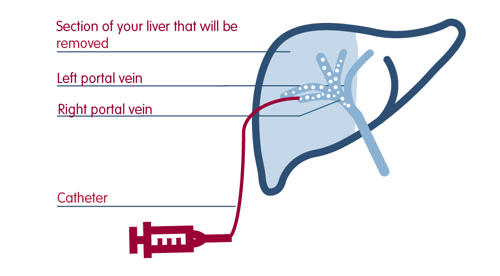What to expect?
If you are eligible for a portal vein embolization, you will be referred to an interventional radiologist who can provide more information about the procedure. You will most likely be able to see their anesthesiologist that same day, to see if you are in good enough shape to handle the sedative.
Please inform your practicing physician if you use medication that prevents blood coagulation. If possible, you will have to stop using this medication before the procedure. You will probably have to spend one night at the hospital. Please do not eat solid foods 8 hours before the procedure, and only drink clear liquids. Please do not drink anything 4 hours before the procedure,
Your specialized anesthesiologist will put you to sleep before the procedure. The procedure will take place at the radiology department. You will be lying down on your back with an x-ray tube. This table is designed for use with image-guided procedures.
Guided by ultrasound and x-ray, your interventional radiologist will puncture the portal vein through your sides or epigastrium. We will make scans using a contrast agent to map out the anatomy of the portal vein. Then the interventional radiologist will close the part of the portal vein that won't be necessary anymore using microparticles, glue, small metal coils, and/or a plug. After your treatment, the area of the puncture will be closed using glue or a small plug.
You can wake up peacefully in the recovery room after your procedure. Once you are properly awake, you can return to your ward. Most patients can go home the next day. Approximately 3 to 4 weeks after your procedure, you will come back for a new CT (and MRI) scan to assess whether the liver has sufficiently grown and whether hepatic surgery is an option for you.
What are the potential risks and complications?
Most people experience mild pain on the side of the liver after the procedure. If necessary, we can give you some painkillers to take home. A few people may experience nausea or vomiting, abdominal pain, and feel. This should pass with time.
Potential complications include:
- Hematoma near the puncture spot.
- Hemorrhaging. This may cause pain, dizziness, or transpiration. Please notify your nurse if this happens to you.

 nl
nl
 Nederlands (Nederland)
Nederlands (Nederland)
 English (United States)
English (United States)